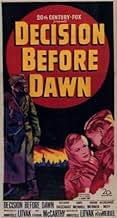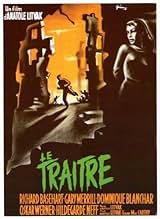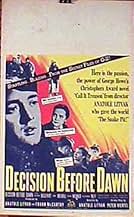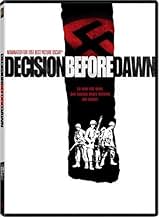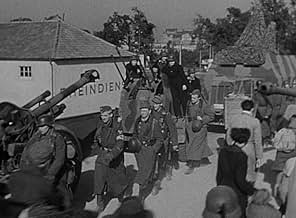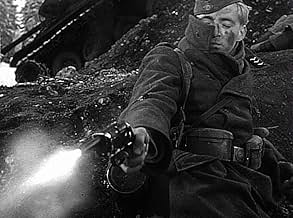IMDb रेटिंग
7.2/10
3.2 हज़ार
आपकी रेटिंग
अपनी भाषा में प्लॉट जोड़ेंAs the US Army approaches Nazi Germany, they recruit German prisoners of war to spy behind German lines.As the US Army approaches Nazi Germany, they recruit German prisoners of war to spy behind German lines.As the US Army approaches Nazi Germany, they recruit German prisoners of war to spy behind German lines.
- 2 ऑस्कर के लिए नामांकित
- 1 जीत और कुल 4 नामांकन
Hildegard Knef
- Hilde
- (as Hildegarde Neff)
Wilfried Seyferth
- Heinz Scholtz - SS Man
- (as Wilfried Seyfert)
Robert Freitag
- Sgt. Paul Richter
- (as Robert Freytag)
Harold Benedict
- Lt. Pete Gevers
- (as H.L. Benedict S/Sgt. USAF)
H.W. Briggs
- Self
- (as H.W. Briggs Sgt. USA)
D.G. Devine
- Lt. Rennick's Driver
- (as D.G. Devine Cpl. USAF)
L.E. Dixon
- Self
- (as L.E. Dixon Maj. USA)
B.L. Hendrickson
- Self
- (as B.L. Hendrickson T/Sgt. USA)
फ़ीचर्ड समीक्षाएं
Surprisingly good war film unknown to me before I saw it on American Movie Classics. Cast is excellent. Characters are well-drawn. The film is the best portrayal I have yet seen on celluloid of Germany in its stages of final collapse as the end of WWII nears. Some very impressive interiors are beautifully shot - the cathedral that serves as intelligence hq, and the castle or chateau that is the German command hq. Engrossing story of conflicted loyalties, and good action and suspense as well. I can only add my agreement with the positive comments already entered.
10B24
Occasionally I rate a film high for personal and sentimental reasons. In this case I am compelled by objective facts to add in the light of greater perspective that I consider this one of the best war movies of all time.
In the first place, the acting is superb. The casting is flawless. The direction is taut, as is the editing. It is filmed in black and white, as it would have to be even today if someone wanted to try a remake. The locations and sets are authentic to a "T." The story itself follows faithfully the text of a book I read as a child (before I saw the film, in fact).
Moreover, I consider it an act of bravery on the part of the film's producers even to begin a project like this so soon after the end of World War II, when passions against the Germans were still running high and mere caricatures of that nation's common people remained the standard for the day (and for years to come).
Oskar Werner in the main role was a brilliant choice, and veterans Richard Basehart and Gary Merrill provide ample evidence that casting proceeded on a basis of resolute excellence and authenticity. I am still blown away by revisiting the "Romantic Road" in Germany and thinking how this movie defined and continued to define for me how recent and ancient history converged along that path.
I cannot praise it enough.
In the first place, the acting is superb. The casting is flawless. The direction is taut, as is the editing. It is filmed in black and white, as it would have to be even today if someone wanted to try a remake. The locations and sets are authentic to a "T." The story itself follows faithfully the text of a book I read as a child (before I saw the film, in fact).
Moreover, I consider it an act of bravery on the part of the film's producers even to begin a project like this so soon after the end of World War II, when passions against the Germans were still running high and mere caricatures of that nation's common people remained the standard for the day (and for years to come).
Oskar Werner in the main role was a brilliant choice, and veterans Richard Basehart and Gary Merrill provide ample evidence that casting proceeded on a basis of resolute excellence and authenticity. I am still blown away by revisiting the "Romantic Road" in Germany and thinking how this movie defined and continued to define for me how recent and ancient history converged along that path.
I cannot praise it enough.
Having served in the US Army-Europe in Germany it was easy to see that this work was an accurate depiction of the world as Germans saw it in those years. Going to the IMDb database confirmed that it was filmed in Wurzberg, a city I visited many times. One can not help but wonder what memories and nightmares came back to life for the German people in this movie, or the ones who viewed it, or even witnessed the movie being made. The film is so very realistic in script, acting, and setting that some must have almost thought WWII was alive again. For those that lived through WWII in that country it must have seemed as if those days were repeating themselves. Every detail of this movie is accurate as far as I could tell. It does not employ overused stereotypes, no action heroes, no earth shaking grand and glorious finale, it simply depicts a period of time in all its' tragedy and irony in a most realistic manner. This work deserves more praise and exposure than it has received. A must see for every WWII researcher and historian.
A taut story, first-rate acting, and a compelling subject make this film worth seeing.
Espionage/spying is a tricky subject, but "Decision Before Dawn" handles it brilliantly. No flash, no Mata Haris, no absurd coincidences. Weaving human drama and the grim realism of war, this film is that rare gem that manages to teach without preaching.
Among the superb performances is our hero Happy, played with just the right blend of suspense and humanity by Oskar Werner. Happy (an ironic name given to him by his American overseers) is torn between love of his native land and his duty to what is right. Werner walks this tightrope better than most I've seen.
In the end, however, it's the script that is the true gem of the film. Peter Viertel is a master story teller, with such great screenplays as "Saboteur" and "The Hard Way" to his credit. Viertel, with a story by author George Howe, weaves an intricate, but not confusing, narrative of war and devotion and duty. He's one of the few _writers_ I look for when I check out "On TV This Week" on IMDB.
Espionage/spying is a tricky subject, but "Decision Before Dawn" handles it brilliantly. No flash, no Mata Haris, no absurd coincidences. Weaving human drama and the grim realism of war, this film is that rare gem that manages to teach without preaching.
Among the superb performances is our hero Happy, played with just the right blend of suspense and humanity by Oskar Werner. Happy (an ironic name given to him by his American overseers) is torn between love of his native land and his duty to what is right. Werner walks this tightrope better than most I've seen.
In the end, however, it's the script that is the true gem of the film. Peter Viertel is a master story teller, with such great screenplays as "Saboteur" and "The Hard Way" to his credit. Viertel, with a story by author George Howe, weaves an intricate, but not confusing, narrative of war and devotion and duty. He's one of the few _writers_ I look for when I check out "On TV This Week" on IMDB.
For anyone who is used to freedom, this movie shows better than any other what it is like to live in a total police state. The Thousand-Year Reich is shown with every wart and blemish, making this one of the greatest propaganda movies for freedom. But it is a harrowing experience, a true thriller. For the life of me, I cannot understand why this film is not better known and why it is hardly available in public libraries. Could this reflect the conservative, McCarthyite influence on movies? I think it is a must-see.
क्या आपको पता है
- ट्रिवियाOne of the first films after World War II to portray the German people--outside of the Nazi regime--in a sympathetic light.
- गूफ़Karl is mistakenly called a corporal. The Luftwaffe uniform that he wears both in the US POW cage and while back in Germany has the rank insignia of an "Obergefreiter", specifically three winged emblems on the collar patches, plain shoulder straps and two chevrons on his left sleeve. Also when the list is checked for his name at the bridge the rank is written down as 'Gfr' (gefreiter) The ranks of Gefreiter, Obergefreiter and Stabsgefreiter (all which were partially identified by chevrons on the sleeve) were not NCOs and had no command authority over other soldiers. They were simply grades of seniority and would be more equivalent to Private First Class (PFC) in the US military. The German rank that is the closest equivalent to Corporal is Unteroffizer. Also, Karl is wearing the medical badge on his right sleeve; Luftwaffe enlisted medical personnel wore the badge on the left sleeve, while Wehrmacht (army) wore it on the right.
- भाव
Lt. Dick Rennick: [Intro narration] Of all the questions left unanswered by the last war, and probably any war, one comes back constantly to my mind. Why does a spy risk his life... for what possible reason? If the spy wins, he's ignored. If he loses, he's shot.
- कनेक्शनReferenced in That Girl: Decision Before Dawn (1968)
- साउंडट्रैकAch, wie ist' möglich dann (Treue Liebe)
(uncredited)
Written by Friedrich Kücken (1827)
टॉप पसंद
रेटिंग देने के लिए साइन-इन करें और वैयक्तिकृत सुझावों के लिए वॉचलिस्ट करें
- How long is Decision Before Dawn?Alexa द्वारा संचालित
विवरण
- रिलीज़ की तारीख़
- कंट्री ऑफ़ ओरिजिन
- भाषाएं
- इस रूप में भी जाना जाता है
- Decisión al amanecer
- फ़िल्माने की जगहें
- उत्पादन कंपनियां
- IMDbPro पर और कंपनी क्रेडिट देखें
- चलने की अवधि1 घंटा 59 मिनट
- रंग
- पक्ष अनुपात
- 1.37 : 1
इस पेज में योगदान दें
किसी बदलाव का सुझाव दें या अनुपलब्ध कॉन्टेंट जोड़ें



